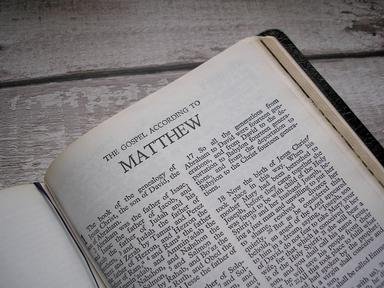Quiz Answer Key and Fun Facts
1. Jesus' discourse on "the sheep and the goats" is also referred to "The Judgment of the Nations". Both of these are derived from the verse reading: "All the nations will be gathered before him, and he will separate people one from another as a shepherd separates the sheep from the goats." Who will be doing this separating?
2. In this passage, the "sheep" are used as a metaphor for the righteous. Where does this metaphorical shepherd put these sheep?
3. As the allegory continues in the NRSV: "The king will say to [the sheep], 'Come, you that are blessed of my Father, inherit the kingdom prepared for you from ______." What phrase goes in the blank?
4. The king then delineates the actions that have led these righteous to be favored: "For I was hungry and you gave me food, I was thirsty and you gave me _____." What word or phrase completes the NRSV quote?
5. Another action of the blessed the king cites is: "I was a stranger and you ________ me." What act is referenced here in the NRSV?
6. The king continues: "I was naked and you gave me clothing, I was sick and you took care of me, I was in prison and you ________." What did the righteous do for those in prison?
7. After the king praises the righteous for their acts of compassion, they ask him when they have ever helped him in times of need. He replies: "Truly I tell you, just as you did it to _________, you did it to me." Who are the king's surrogates in this NRSV passage?
8. After addressing the righteous, the king turns to the other group, the putative "goats". How does the king address these in the NRSV?
9. The "goats" in this passage protest, asking when they ever saw the king in need. He responds: "Truly I tell you, just as you did not do it to one of _________, you did not do it to me." What NRSV words go in the blank?
10. Where in the Gospel of Matthew can Jesus' discourse on "The Sheep and the Goats" be found?
Source: Author
stuthehistoryguy
This quiz was reviewed by FunTrivia editor
CellarDoor before going online.
Any errors found in FunTrivia content are routinely corrected through our feedback system.

